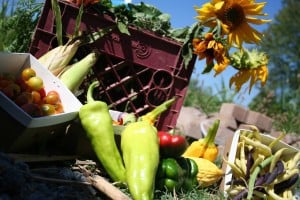 Download a copy of the Hazon Food Guide
Download a copy of the Hazon Food Guide
Hazon has been steadily working to compile best practices around food for Jewish institutions. The Hazon Food Guide Toolkit will help you navigate food choices in your synagogue, JCC, camp, Hillel, or other institution and offers practical suggestions for bringing our ancient tradition of keeping kosher–literally, eating food that is “fit”– to bear on the range of food choices we’re making today.
Hazon’s Food Guide Toolkit is full of inspiration, ideas, definitions, real-life stories, and guidance. It seeks to help us to approach the daily act of feeding ourselves and our communities with the kind of sanctity, satisfaction, and gratitude our tradition celebrates.
Jewish institutions—as the gathering places of our people, the places where we convene to learn, to pray to socialize, to heal, and yes, to eat—have the opportunity to do this in meaningful and perhaps even game-changing ways. So use the Food Guide Toolkit to help you take the first steps.
We’d love to hear from you. If you have questions about the Food Guide, or want to share your challenges, successes and stories, send us a note at foodeducation@hazon.org.
This latest draft of the Hazon Food Guide is the result of many hardworking hands. Huge thanks to the following people who have brought this project to life!
Judith Belasco, Poppy Berelowitz, Alyssa Berkowitz, Ellen Botnick, Miriam Coates, Chloe Friedman, Rachel Gelman, Paul Goettlich, Justin Goldstein, Richard Grayson, Anna Hanau, Daniel Infeld, Leah Koenig, Liz Kohn, Rachel Loebl, Becky O’Brien, Shuli Passow, Robin Rifkin, Rachel Jacoby Rosenfeld, Rachel Sacks, Brooke Saias, Nigel Savage, Amanda Schanfield, Nadia Schreiber, Natalie Soleil, Edith Stevenson, Rabbi Jeffrey Summit, Lauren Wasserman, Cassie Weinstock, and Jake Wilkenfeld-Mongillo.
We would like to acknowledge and thank Emanuel J. Friedman Philanthropies for their support of Hazon’s collaborative work with the Humane Society of the United States and the Jewish Initiative for Animals (JIFA). JIFA, which focuses on Jewish values and compassion to animals, contributed substantially to this revised edition. Special thanks to Dr. Aaron Gross, Sarah Chandler, and Melissa Hoffman.
The Jewish Farm School, the Teva Learning Center, and Earthworks Urban Farm.
Special thanks to the Baltimore Food and Faith Project at the Johns Hopkins Center for a Livable Future for allowing access and use of their Faith Community Food Audit which formed the basis for the Hazon Food Audit.




